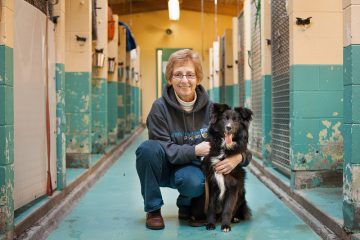Ph.D. student Gosia Zobel wins prize for best presentation
Gosia Zobel, a PhD student in UBC’s Animal Welfare Program, took home the coveted award for best student presentation at the University of Guelph’s 6th Annual Animal Welfare Symposium. Gosia’s presentation discussed emerging health and welfare issues for dairy goats. Her energetic and simple presentation style earned the audience’s approval.
AWP research on lameness featured in Hoard’s Dairyman
Recent results from benchmarking research on cow lameness and hock injuries were featured in this article in the current issue of Hoard’s Dairyman. Hoard’s is one of the most influential magazines serving the dairy industry.
A good life for lab animals?
Most discussion on the welfare of laboratory animals focuses on harm reduction, including methods of handling and euthanasia that are less likely to cause pain or distress. UBC researchers are now trying to change the focus to what constitutes “a good life” for lab animals. This week Dan Weary delivered the Keynote Address on this […]
More news on sow stalls
The Retail Council of Canada, including heavy hitters such as Safeway, Costco, and Walmart have announced they will transition to buying from pig farms that do not use gestations stalls for sows. To find out more read this article. For some context on what this might mean for other sectors in animal agriculture, see this […]
Hock injuries in dairy cows
Lameness, mastitis and transition-cow diseases are widely recognized as serious animal welfare and production-limiting issues. Hock injuries should raise similar concerns, though they’ve received much less attention, say Dan Weary, University of British Columbia dairy scientist and cow behavior expert and fellow animal welfare expert Marina (Nina) von Keyserlingk in Vancouver, Canada. Read more: http://www.agriview.com/news/dairy/hock-injuries-animal-welfare-concern-deep-bedded-maintained-stalls-best/article_33f91dd6-b356-11e2-820b-001a4bcf887a.html
PhD Student Improves Life for Shelter Dogs
Living in a shelter can be a very traumatic experience for an animal – something Nancy Clarke has witnessed first-hand over her years working at the Vancouver Animal Shelter.
